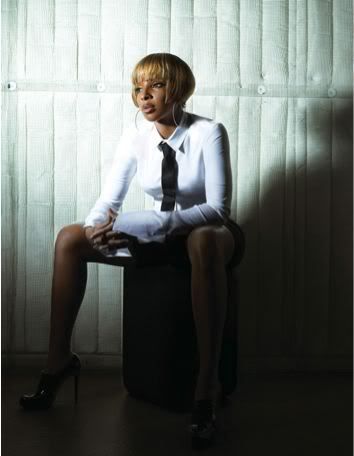Take Me As I Am: Mary, MJB, or Nigga?
BY Michael Partis

Mary on her relationship with Oprah“’Oprah was like, ‘I didn’t care for you, but it was when I got to know you that I realized who you were.’ Though Oprah is now a friend, Mary is not surprised at her opinion. ‘I understand somebody like her wouldn’t even feel me at all.’ Mary says. ‘I’m a nigga, you know what I’m sayin? So when she said that to me, I was like, ‘Thank you for that honesty.’”
Mary J. Blige
No Shame
VIBE February 2008
Mary J. Blige has always been known for her sincerity. Through her lyrics, words, and voice, she has made songs, interviews, and powerful vocal performances convey the Mary J. Blige Experience; an experience that has taken listeners and observers through a odyssey of pain, joy, tears, Real Love, life, No More Drama, Yonkers, hip-hop soul, ghetto fabulous, happiness, and everything else that makes her Mary. It is a life no one could fake, and has a part everyone within the Hip-Hop nation could relate to. That is why for over the past fifteen years, Mary has and continues to serve as a symbol of the Black female experience.
Mary’s symbol status is indicative of the consciousness of our post-Civil Rights and post-crack era generation. The socio-economical problems of our inner-cities were communicated through the medium of Hip-Hop music. It was a medium that elders, like C. Dolores Tucker and Calvin Butts, did not understand. The elders and the critics knew that the destructive violence expressed in Black-on-Black crime, or derogatory treatment of women and blatant sexism was wrong. But they didn’t understand why there were “Niggas With Attitudes;” or why they lived a “T.H.U.G. L.I.F.E;” or why “cash ruled everything around me.” They did not know why it was on the young people’s minds, and they did not know why they had to communicate it with rage, anger, pain, and vulgarity.
So it only makes sense that the greatest symbol of Black upward mobility and financial success over the past twenty-five didn’t understand Mary J. Blige. It’s only logical that even though they shared the same condition of being a successful Black woman in American society, Oprah Winfrey just didn’t “care” for MJB.
But what do a whole generation of young people of color who were not recognized by their elders, not respected by their elders, and not “cared” for by their elders see themselves as???”
They see themselves as “niggas”. And it is within this context that the word “nigga” has developed over the past twenty-five years.
A generation of young people (with African Diasporic lineage) that were marginalized and neglected developed their own voices and conveyed their own lived experience through Hip-Hop music and culture. They constructed their identity and developed an understanding of themselves and others through a self-appropriation of the word “nigger.” This successful (or attempted, depending on your opinion) self-appropriation of the word makes “nigger” transform into the vernacular “nigga.” You can only become the reflexive, communally-accepted “my nigga” if you show some understanding, comprehension, or connection with the post-Civil Rights Movement, post-Crack Era inner-city lived experience of those from the African Disaporic community. If you can’t connect, then you become the general, impersonal “that nigga” or “them niggas.”
Are there more usages than what I just gave above: absolutely. Is there tremendously more complexity in how the word is used than I explained above: absolutely. But do a large number of youth within the Hip-Hop culture use “nigga” within the context I stated above as a reference to their identity: absolutely.
This is why Mary J. Blige can understand why Oprah did not like at first; there is a whole generation of people who are Oprah’s contemporaries and in her cohort who don’t “care” for “niggas” either.
So if one of the most famous and successful Black artists of the past fifteen years sees herself as a “nigga,” there’s a whole generation seeing themselves the same way.
What are the consequences of this? And what are the consequences for what is becoming now a second generation of young people who construct their identity as “niggas?”
In his 1998 book “Yo’ Mama’s DisFUNKtional!: Fighting the Cultural Wars in Urban America” Robin D.G. Kelley takes social scientists and other academics and researchers to task for their singular, archetypal, stereotypical approach to looking at African Americans in urban environment in a chapter he called “Looking for the ‘real’ Nigga.” Hopefully the generation of C. Dolores Tucker’s, Calvin Butts’, and Oprah Winfrey’s who didn’t “care” much about young “niggas” before can rid themselves of the thinking Kelley talks about. And then they and the generation of Mary J. Blige (who grew up thinking of themselves as “niggas”), can come together to see how the poverty, sexism, racism, prison industrial complex, police brutality, and inequality in the American justice system that still plagues people of color in today society is making new “niggas” everyday.
Maybe then people would finally see that Hip-Hop didn’t create these problems. And Hip-Hop is certainly not creating these “niggas.”
Michael Partis
michaelpartis@gmail.com
myspace.com/hiphopthought
http://michaelpartis.blogspot.com/
http://my.rawkus.com/profile/ForeThought

